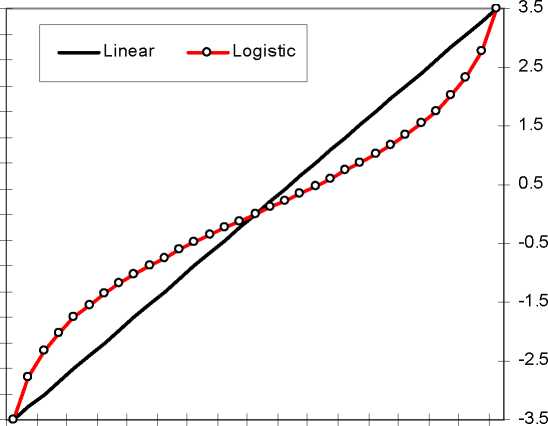data sample for the random effects specification. As in the main text we present for each
rating agency an unrestricted and a restricted model. The overall fit seems very good
even though slightly lower than the one obtained with the linear transformation. Again
broadly the same core variables are also picked up as relevant determinants of the rating
levels: GDP per capita, GDP growth, government debt, government effectiveness
indicators, external debt, external reserves, and default history.
Table A3.1 - Logistic transformation
|
Rating |
AAA |
AA+ |
AA |
AA- |
A+ |
A |
A- |
BBB+ BBB BBB- |
BB+ |
BB |
BB- |
B+ |
B |
B- |
<B- | ||
|
Linear |
17 |
16 |
15 |
14 |
13 |
12 |
11 |
10 |
9 |
8 |
7 |
6 |
5 |
4 |
3 |
2 |
1 |
|
Logistic |
3.5 |
2.34 |
1.76 |
1.35 |
1.02 |
0.74 |
0.48 |
0.24 |
0 |
-0.2 |
-0.5 |
-0.7 |
-1 |
-1.4 |
-1.8 |
-2.3 |
-3.5 |
Figure A3.1 - Linear and logistic transformations
17

16
15
14
13
12
11
10
9
8
7
6
5
4
3
2
1
61
More intriguing information
1. EFFICIENCY LOSS AND TRADABLE PERMITS2. The name is absent
3. The name is absent
4. The resources and strategies that 10-11 year old boys use to construct masculinities in the school setting
5. AGRICULTURAL PRODUCERS' WILLINGNESS TO PAY FOR REAL-TIME MESOSCALE WEATHER INFORMATION
6. The name is absent
7. Draft of paper published in:
8. Individual tradable permit market and traffic congestion: An experimental study
9. EU Preferential Partners in Search of New Policy Strategies for Agriculture: The Case of Citrus Sector in Trinidad and Tobago
10. Structure and objectives of Austria's foreign direct investment in the four adjacent Central and Eastern European countries Hungary, the Czech Republic, Slovenia and Slovakia